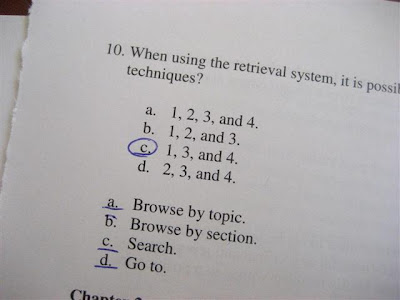Summary
Feedback Friday is a week late, and there hasn't been a post in two weeks; The Metaist is in ad-hoc mode (but not for long).
Feedback
As always, this is your place to voice your opinion on things you'd like discussed in future posts.
Friday, February 12, 2010
Sunday, January 24, 2010
Clever Hans Effect
Summary
Clever Hans was a horse that seemed to be able to perform arithmetic and solve puzzles. However, after a formal 1907 investigation, it was shown that Hans was actually picking up on and responding to subtle audience cues rather than solving problems.
Commentary
The Clever Hans Effect is important because it exposes how some of our involuntary reactions influence or cue others. This is why there are occasionally problems with police lineups or interrogation of children. It is also why use of double-blind experiments is encouraged.
More on this later.
See Also
Clever Hans was a horse that seemed to be able to perform arithmetic and solve puzzles. However, after a formal 1907 investigation, it was shown that Hans was actually picking up on and responding to subtle audience cues rather than solving problems.
Commentary
The Clever Hans Effect is important because it exposes how some of our involuntary reactions influence or cue others. This is why there are occasionally problems with police lineups or interrogation of children. It is also why use of double-blind experiments is encouraged.
See Also
- Interrogation Of Children at Institute for Psychological Therapies for a lengthy discussion on the subject.
- Observer-expectancy effect at Wikipedia for the general form of this issue.
Labels:
bunk,
psychology
Friday, January 22, 2010
First Instinct Fallacy
Summary
Popular advice about taking multiple-choice tests is to stick with your first response because, you're more likely to switch from a correct response to an incorrect one. However, many decades of research seem to suggest otherwise.
Commentary
A study on strategies for multiple choice tests posed the following question to students and teachers:
The study goes on to show that the reason so many people think that sticking with your first answer is better is because of excessive counterfactual thinking. That is, when you change answer from a correct response to an incorrect one, you are more likely to think "if only I hadn't..." which is easier to recall in the future.
See Also
Popular advice about taking multiple-choice tests is to stick with your first response because, you're more likely to switch from a correct response to an incorrect one. However, many decades of research seem to suggest otherwise.
Commentary
A study on strategies for multiple choice tests posed the following question to students and teachers:
When taking multiple-choice tests, it is sometimes the case that one answer seems correct at first, but upon further reflection another answer seems correct. As a general rule is it better to stick with your initial "first instinct" - or to change your answer if another choice seems better? In other words, which answer is probably more likely to be correct?Many students and teachers thought that the first answer you choose is more likely to be correct. Yet, the reality is quite different. Here is an excerpt of the study's results regarding changed answers:
- 51% - wrong to right,
- 25% - right to wrong, and
- 23% - wrong to wrong
The study goes on to show that the reason so many people think that sticking with your first answer is better is because of excessive counterfactual thinking. That is, when you change answer from a correct response to an incorrect one, you are more likely to think "if only I hadn't..." which is easier to recall in the future.
See Also
- Counterfactual Thinking and the First Instinct Fallacy for the full text of the study.
Labels:
psychology
Thursday, January 21, 2010
Cargo Cults
Summary
A cargo cult is a type of religious practice that may appear in traditional tribal societies in the wake of interaction with technologically advanced cultures. (Source: Wikipedia)
Cargo cults provide an interesting insight into the development of beliefs and rituals. The concept of cargo cults has been extended to include any superficial copy that is disconnected from the underlying workings.
Meta
What are other examples of cargo cults?
See Also
A cargo cult is a type of religious practice that may appear in traditional tribal societies in the wake of interaction with technologically advanced cultures. (Source: Wikipedia)
(Video: YouTube)
CommentaryCargo cults provide an interesting insight into the development of beliefs and rituals. The concept of cargo cults has been extended to include any superficial copy that is disconnected from the underlying workings.
Meta
What are other examples of cargo cults?
See Also
- Detached Lever Fallacy at Less Wrong (formerly Overcoming Bias) for a somewhat related discussion on artificial intelligence systems.
- Tanna: John Frum Day Sulfa Bay at YouTube for part of the annual ceremonies.
- Great Designers Steal at YouTube for a discussion about a similar behavior among designers.
Labels:
religion
Wednesday, January 20, 2010
Pentatonic Scale
Summary
The pentatonic scale is a musical scale (i.e. group of notes) with five pitches. It appears in music worldwide and may be related to how humans process music.
Enjoy!
The pentatonic scale is a musical scale (i.e. group of notes) with five pitches. It appears in music worldwide and may be related to how humans process music.
Enjoy!
(Video: YouTube)
Subscribe to:
Posts (Atom)




